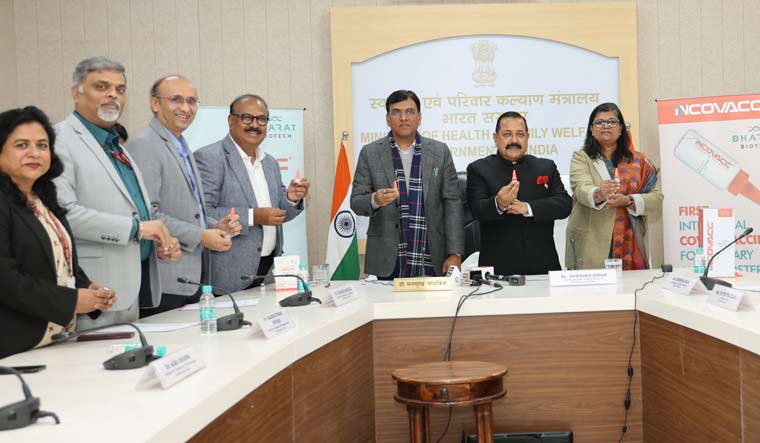Union Health Minister Mansukh Mandaviya and Science and Technology Minister Jitendra Singh unveiled the world’s first India-made intra-nasal Covid-19 vaccine, iNCOVACC, on the occasion of the Republic Day on Thursday.
The vaccine, developed by Bharat Biotech International Limited (BBIL) in collaboration with Biotechnology Industry Research Assistance (BIRAC), is priced at Rs 800 for private markets and at Rs 325 for supplies to the central government and state governments. BIRAC is a PSU under the Department of Biotechnology, Ministry of Science and Technology.
The vaccine is easy to deliver and does not need any syringe or needle, said Bharat Biotech chairman Dr Krishna Ella. “Most important it produces three immune responses, IgG, IgA, and T cell response. No other vaccine in the world can produce three responses compared to the injectable, which produced mostly IgG or T cells response," he told news agency ANI.
Speaking on the occasion of the launch, Mandaviya said over 65 per cent of vaccines supplied in the world are from India. Congratulating the BBIL team and the department of Biotech on developing the “world’s first” nasal vaccine, he said this marks a glorious tribute to the call for Atmanirbhar Bharat.
India’s vaccine manufacturing and innovation capability is appreciated all over the world as it has made a mark in producing quality and affordable medicines, the health minister further said.
According to an official statement, iNCOVACC is a cost effective Covid-19 vaccine which does not require syringes, needles, alcohol wipes or bandage, thus saving costs related to procurement, distribution, storage, and biomedical waste disposal, that are routinely required for injectable vaccines.
It utilizes a vector-based platform, which can be easily updated with emerging variants leading to large scale production, within a few months. These rapid response timelines combined with the ability of cost effective and easy intranasal delivery, makes it an ideal vaccine to address future infectious diseases, the statement said.
According to the health ministry, a rollout of iNCOVACC is expected to begin in private hospitals that have placed advance orders. Initial manufacturing capacity of several million doses per annum has been established, and this can be scaled up to a billion doses as required, the ministry said.




